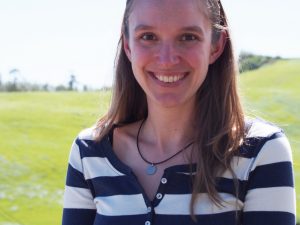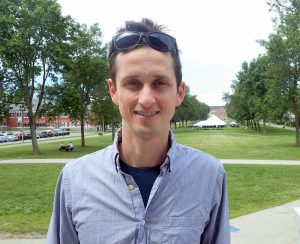SMS Welcomes New Faculty, Part 1
In a two-part series, we welcome four new faculty members to the School of Marine Sciences. This month, we profile Professors Kristina Cammen and Josh Stoll. In the next issue, we will profile Professors Aaron Strong and Nishad Jayasundara.
Assistant Professor Kristina Cammen was born in Boothbay Harbor, Maine, and moved with her family to Maryland when she was five years old. Despite leaving at such an early age, she has fond memories of her childhood in Maine, such as being out on the water in the motor boat. She doesn’t remember the winters or the black flies, however!

It was at Duke University where she met fellow student and future spouse, Josh Stoll –a happy coincidence since he, too, was from Maine. After receiving her Ph.D., she and Josh agreed to move back to Maine, where they both started at UMaine; he in the Ph.D. program in the Fall of 2013 and she the following Fall as a postdoc.
Here at UMaine, Kristina is studying marine mammals and is currently focusing on the gray and harbor seals. She and her team are looking at questions related to genetics and health, genetic diversity, and how populations have changed during historical bottlenecks and recent recovery. She is also exploring new ideas that relate to influenza in the seals, as well as the effects of human created noise such as that from Navy SONAR and ships on dolphins and whales in the Gulf of Maine and elsewhere. This is an emerging idea for which she is currently writing grants.
She doesn’t have any graduate students yet in her lab at Murray Hall. She does have a few undergrads doing honors thesis and capstones but she will recruit graduate students next year when she moves to her new lab in Hitchner Hall.
She is excited about a new program at UMaine called One Health. This emerging program involves faculty members across many departments and will focus on interaction between animal health, human health, and ecosystem health. The approaches in this program are similar to the approach she takes in research and teaching her ocean health class. In addition to that class, Dr. Cammen also teaches INT 308, Conservation and Ecology of Marine Mammals.
Although she only lived here a few years early in her life, she is happy to be back in Maine and teaching at UMaine.
Our newest professor, Assistant Research Professor of Marine Policy Dr. Josh Stoll, started at UMaine on May 1st. His focus is on people and community fishing and how to develop a system that will help both the fisheries and the communities they support. The Gulf of Maine is culturally and economically historical, he says, and UMaine plays a key role in the fisheries in the Gulf. Around the world people know about the fisheries and fishery management of Maine and Josh is excited to continue that history. His work here studying the human system connected to marine science compliments the work being done in the biology and oceanography aspects of marine science. He works on markets and seafood trade, looking at sustainability and what drives fisheries, such as how market changes and evolution can cause changes in fishermen’s behavior.

Josh grew up in the Downeast town of Harrington and later split time between there and Portland. Later, he lived in Washington state, Washington D.C., and North Carolina before he came back to Maine for good. While working on his Masters at Duke, he met his future spouse, Dr. Kristina Cammen and they decided to move back to Maine where he was able to complete his Ph.D. at UMaine.
His office is in Libby Hall where he currently has one graduate student whom he shares with Dr. Heather Leslie at the Darling Marine Center. He will be teaching a new fisheries policy class and will develop more classes for future semesters.
He cares about sustainable coastal communities and the human dimension of fisheries. Coastal community resilience is a key factor – how well positioned are these communities to adapt to changes like market crashes or a marked increase in aquaculture. A new approach he is looking at is ecosystem-based fisheries management, including all the fisheries, that allows the management of parts of the Gulf of Maine so that the whole community is involved, where they will work together for a better outcome for all.
